2019年06月17日
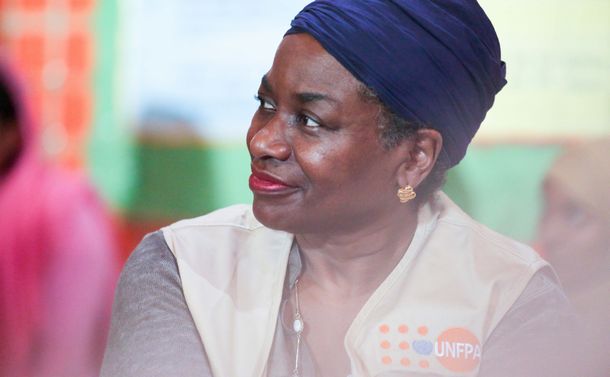 Natalia Kanem visiting a Rohingya refugee camp in Bangladesh (May 23, 2018)
Natalia Kanem visiting a Rohingya refugee camp in Bangladesh (May 23, 2018)A quarter-century ago, a seismic shift in global development took place in Cairo. Gathered at the International Conference on Population and Development (ICPD), 179 governments – including Japan -- recognized that the world’s population was not a balance sheet but a rich tapestry of people’s lives. The ICPD adopted a landmark Programme of Action that placed individual dignity and the right to plan one’s family at the very heart of development.
I was there when it happened. I joined the many government delegates, public health leaders, women’s rights activists, researchers and youth advocates who assembled in Cairo in 1994 with a sense of mission and purpose. What inspired us, and millions around the world, was the simple conviction that population is not about numbers, but about people. We were united in the belief that women and girls must be placed squarely at the centre of the development agenda; that all human beings have the right to decide freely whether, when and with whom to have children; and that everyone must have the means to exercise this basic human right.
It is that simple. So simple, in fact, that many may take it for granted. Yet 25 years ago, in many parts of the world, that dream seemed far out of reach. And even today, this fundamental right is still not a reality for all.
In 1994, at the time of the Cairo conference, I was the Ford Foundation’s representative in West Africa, working to ensure reproductive health and rights for women, helping them lead dignified and empowered lives free of harmful practices like female genital mutilation. It was a pivotal year for Africa: just months before the ICPD, we celebrated the end of apartheid and the election of President Nelson Mandela in South Africa.
Change was in the air, and the agreement reached in Cairo was the big pivot women's rights advocates had long been hoping for. There can be few feelings more exhilarating than to suddenly have the backing of the international community for your mission in life. And it wasn’t just any agreement – the ICPD Programme of Action was the most comprehensive and forward-looking international document that had ever been signed on the critical issues for which we had fought so hard.
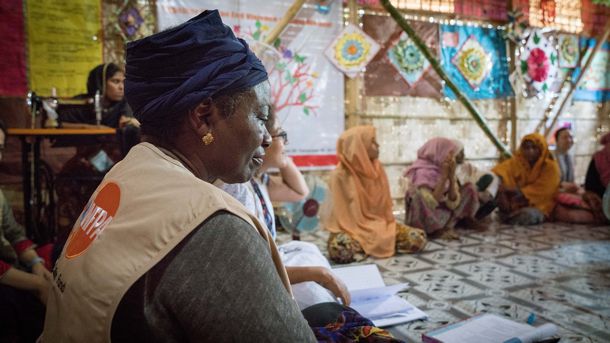 Natalia Kanem listens to the stories of female refugees at Women Friendly Space created by UNFPA within the Rohingya refugee camp, with support from the Japanese government, among other donors. (May 23, 2018)
Natalia Kanem listens to the stories of female refugees at Women Friendly Space created by UNFPA within the Rohingya refugee camp, with support from the Japanese government, among other donors. (May 23, 2018)More than a billion people have climbed out of poverty, and hundreds of millions have gained access to family planning. Maternal mortality has declined by 40 per cent, and we have made great progress in rooting out harmful practices such as child marriage and female genital mutilation. The proportion of women married as children has dropped from one in four to one in five since 1994.
Yet for many, the promise of Cairo remains far from complete. Over 300,000 women still die each year from complications in pregnancy and childbirth; more than 200 million women who want to plan their pregnancies cannot access contraception; and millions of girls are married off against their will or subjected to genital mutilation. All of these women and girls are robbed of their reproductive rights, the same rights their leaders promised to protect a quarter-century ago.
The framework adopted in 1994 is as relevant as ever, so much so that it was woven into the Sustainable Development Goals. Yet, despite this, sexual and reproductive health and rights have rarely made it into the mainstream discourse among world leaders since Cairo. On the ICPD’s 25th anniversary, it’s time to re-energize the movement and make sexual and reproductive rights a priority for a new generation whose rights are at stake.
As we recommit to the promise of Cairo and accelerate our collective efforts to achieve a world of rights and choices for all, we must also look at some of the incredible advances in reproductive technology that have helped millions of women conceive, and the demographic shifts – such as ageing populations – that are shaping many societies, including Japan’s.
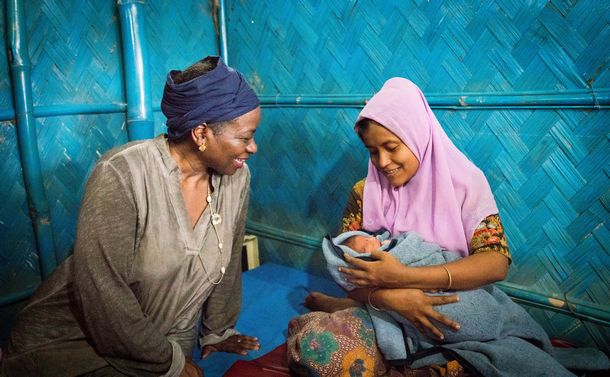 With a woman who just gave birth to a baby, at a reproductive health clinic created within a refugee camp in Bangladesh (May 23, 2018)
With a woman who just gave birth to a baby, at a reproductive health clinic created within a refugee camp in Bangladesh (May 23, 2018)And it is why in November, UNFPA and the governments of the Republic of Kenya and Denmark will convene world leaders, civil society and many other stakeholders at the Nairobi Summit on ICPD25 to discuss, agree on and commit to the path ahead to fully implement the Programme of Action adopted in 1994. We owe it to those still left behind – to the poorest women and girls, to those caught up in humanitarian crises, and to all who face stigma, discrimination and violence.
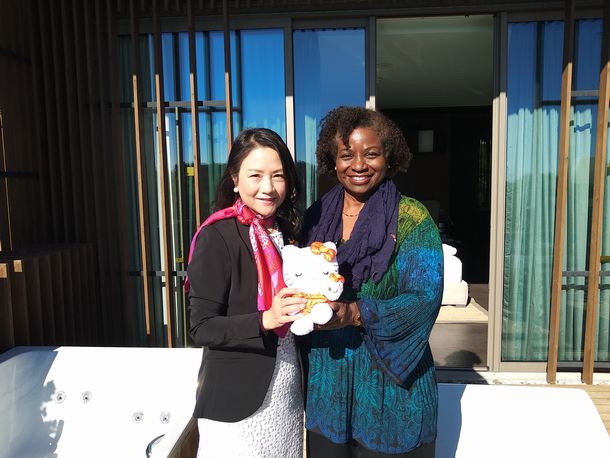 With Vice-President Aya Komaki, from the Hellosmile Awareness Project for Cervical Cancer Prevention (October 26, 2018)
With Vice-President Aya Komaki, from the Hellosmile Awareness Project for Cervical Cancer Prevention (October 26, 2018)
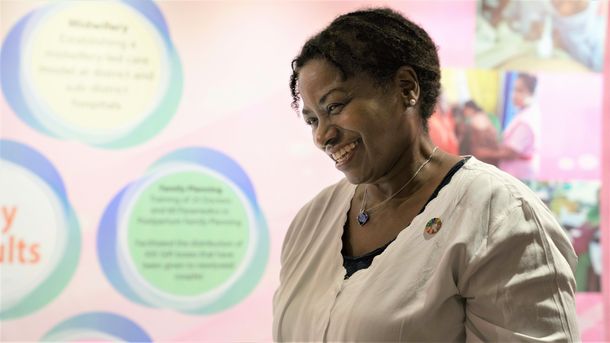 At an event in Bangladesh introducing UNFPA’s work on issues of gender and education. Here, Natalia Kanem is pictured observing a midwife demonstrate how to alleviate labor pain. (May 22, 2018)
At an event in Bangladesh introducing UNFPA’s work on issues of gender and education. Here, Natalia Kanem is pictured observing a midwife demonstrate how to alleviate labor pain. (May 22, 2018)有料会員の方はログインページに進み、朝日新聞デジタルのIDとパスワードでログインしてください
一部の記事は有料会員以外の方もログインせずに全文を閲覧できます。
ご利用方法はアーカイブトップでご確認ください
朝日新聞デジタルの言論サイトRe:Ron(リロン)もご覧ください